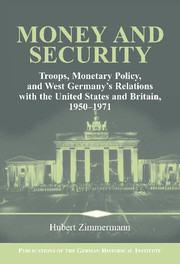 Money and Security
Money and Security Book contents
- Frontmatter
- Introduction
- 1 On Whose Shoulders? German Rearmament and the Cold War Burden
- 2 The British “New Look” and Anglo-German Relations
- 3 Adenauer and “Perfidious Albion”: Troop Reductions, Support Costs, and the Integration of Europe, 1957-1959
- 4 The Radford Plan: America and Its Troops in Germany, 1955-1958
- 5 The Political Economy of U.S. Troop Stationing in Europe
- 6 Offset and Monetary Policy During the Kennedy Administration, 1961-1962
- 7 The Bargain Slowly Unravels: Offset, Troop Reductions, and the Balance of Payments, 1962-1965
- 8 The Culmination of the Burden-Sharing Conflict: Chancellor Erhard’s Visit to Washington in September 1966
- 9 The Trilateral Negotiations of 1966-1967
- Conclusion
- Appendices
- Bibliography
- Index
5 - The Political Economy of U.S. Troop Stationing in Europe
Published online by Cambridge University Press: 05 January 2013
- Frontmatter
- Introduction
- 1 On Whose Shoulders? German Rearmament and the Cold War Burden
- 2 The British “New Look” and Anglo-German Relations
- 3 Adenauer and “Perfidious Albion”: Troop Reductions, Support Costs, and the Integration of Europe, 1957-1959
- 4 The Radford Plan: America and Its Troops in Germany, 1955-1958
- 5 The Political Economy of U.S. Troop Stationing in Europe
- 6 Offset and Monetary Policy During the Kennedy Administration, 1961-1962
- 7 The Bargain Slowly Unravels: Offset, Troop Reductions, and the Balance of Payments, 1962-1965
- 8 The Culmination of the Burden-Sharing Conflict: Chancellor Erhard’s Visit to Washington in September 1966
- 9 The Trilateral Negotiations of 1966-1967
- Conclusion
- Appendices
- Bibliography
- Index
Summary
the causes of the dollar problem
In November 1960 Robert B. Anderson, the U.S. secretary of the treasury, and Douglas Dillon, the U.S. undersecretary of state, paid a visit to Bonn that has been called “a striking symbol” of the changing nature of European-American relations. Whereas in the first postwar decade European delegations crossed the Atlantic to negotiate economic help with their American counterparts, the mission of Anderson and Dillon was aimed at rallying the Europeans to the defense of the American currency, which had been under pressure since 1958. Germany was the main target, and the negotiators' agenda included a request for a direct contribution toward the cost of maintaining U.S. troops in Germany. Press commentators on both sides rushed to the event. The German press commented on the visit with particular malice. Anderson and Dillon were portrayed as begging for money and, to underline this characterization, the German news magazine Der Spiegel printed a photo showing the stout German minister of economics, Ludwig Erhard, lecturing the skinny Anderson. The Anderson-Dillon mission illuminates the increasingly intertwined nature of security and monetary problems in German-American relations. The visit signaled a new framework in which European-American relations were to evolve: The limits of American economic power became visible and contrasted sharply with the success of the European recovery, particularly in the monetary field. This change, partly perception, partly reality, had enormous political consequences. Monetary questions were to affect American-German relations (and American-European relations in general) deeply during the 1960s. A closer look at the causes for and consequences of the visit will help us to understand the real changes taking place and their political significance.
- Type
- Chapter
- Information
- Money and SecurityTroops, Monetary Policy, and West Germany's Relations with the United States and Britain, 1950–1971, pp. 97 - 120Publisher: Cambridge University PressPrint publication year: 2002


